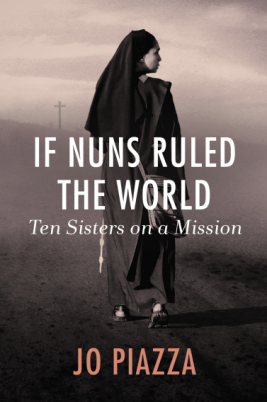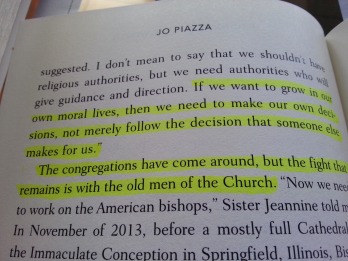One of the most prized dishes in Chinese cuisine is called “The Monk Jumped Over the Wall.” The name comes from the folk belief that the monk was unable to resist the aroma of this delicious dish and jumped the wall in search of it.
Reading Jo Piazza’s If Nuns Ruled The World: Ten Sisters on a Mission, it is clear that these nuns, and others like them, have been drawn by people’s needs, to jump the walls of patriarchy and prejudice.
And there’s no putting them back behind those walls.
Just ask media maven, Sr. Maureen Fiedler: “After all, Jesus was a feminist, and we claim to follow him.”
One nun, though, has accepted being put behind bars for literally breaking through the fences around the nuclear facility in Oak Ridge,Tennessee. Sr. Megan Rice is unfazed by clerical disapproval.
“I don’t believe in excommunication,” she says, “because I don’t see the institutional Church as the real Church.”
Jesus: An Equal Opportunity Employer
 Pope Francis, who has inspired so much hope, sadly still speaks in stereotypes about the “feminine genius.” “The reservation of the priesthood to males, as a sign of Christ the Spouse who gives himself in the Eucharist, is not a question open to discussion,” he says. To which Sr. Maureen Fiedler says: “Jesus is an equal opportunity employer.” Vatican II did say: “any type of social or cultural discrimination based on sex is to be overcome and eradicated as contrary to God’s intent.”
Pope Francis, who has inspired so much hope, sadly still speaks in stereotypes about the “feminine genius.” “The reservation of the priesthood to males, as a sign of Christ the Spouse who gives himself in the Eucharist, is not a question open to discussion,” he says. To which Sr. Maureen Fiedler says: “Jesus is an equal opportunity employer.” Vatican II did say: “any type of social or cultural discrimination based on sex is to be overcome and eradicated as contrary to God’s intent.”
The Gospel comes alive in the community as the sisters find God in places of suffering. They are mending, always mending what Sr. Simone Campbell likes to call the “broken hearts” of those who live on the margins.
People welcome the support they receive from the sisters as they struggle to raise children, make informed choices about their reproductive health, and gain some control over their lives. For years, Sr. Donna Quinn accompanied frightened women to health clinics to shield them from jeering protestors. Today she lobbies for women’s reproductive autonomy. Sr. Tesa Fitzgerald helps women who are in prison stay connected to their children while inside and tackle the myriad hurdles they face when they come out. Recidivism for the women in her “Hour Children” ministry: 3 percent versus 29 percent for women in New York.
The bishops call this work radical feminism.
Who is Isaiah speaking to when he says: “My thoughts are not your thoughts, and my ways are not your ways?”
 Piazza documents Sr. Jeannine Grammick’s pioneering LGBT ministry. Reaching out to LGBT Catholics, celebrating the Eucharist and walking with them in their struggles prompted so much clerical harassment that she chose to leave the School Sisters of Notre Dame and joined the Sisters of Loretto.
Piazza documents Sr. Jeannine Grammick’s pioneering LGBT ministry. Reaching out to LGBT Catholics, celebrating the Eucharist and walking with them in their struggles prompted so much clerical harassment that she chose to leave the School Sisters of Notre Dame and joined the Sisters of Loretto.
The obstructionism of men in high places does not faze Sr. Nora Nash either. As Director of Corporate Social Responsibility for the Sisters of St. Francis, Sr. Nora publicly challenged Lloyd Blankfein on the ugliness of Goldman executives making more in one day than most workers make in a year. “In a way worthy of the gospel of Christ,” she charges right in, holding corporations accountable, introducing stockholder resolutions on wages, labor rights, child labor, predatory lending, fracking and more.
Transcending Limits
The conviction that the Divine is present everywhere is one that Sr. Madonna Buder embraces. This veteran of 366 marathons, 46 of them, Ironman events, insists, “There is no limit, no boundaries, to when and where you can commune with God.”
But limits there certainly are in the underworld of human trafficking. It is a world “so wounded, violent and stripped of hope,” that Sr. Joan Dawber shrank from it. Yet she has made providing safe houses for the victims of human trafficking her life’s work because she feels the “spirit of the Lord” calling her to “let the oppressed go free.”
Sr. Dianna Mae Ortiz herself survived rape and torture and rose above the horrors of her experience in Guatemala to establish the Torture Abolition and Survivors Support Coalition (TASSC). She is haunted by her ordeal but she believes deeply that she was living the Gospel when she decided to stay on in Guatemala despite the death threats. Piazza reports her quietly saying that “on some level I took my place on what I refer to as a modern-day cross.”
Fastened to the thread while piercing the cloth
In Sue Monk Kidd’s The Invention of Wings, as the slave seamstress, Handful, contemplates the terrible risk of trying to escape from early 19th century Charleston, she draws on her mother’s wisdom: “You got to figure out which end of the needle you’re gon be, the one that’s fastened to the thread or the end that pierces the cloth.”
The sisters, it seems, have figured out how to be both.
Dawn Morais Webster was born in Kerala. She is the mother of two young adults, and wife of a man with Quaker and Episcopalian roots. She was raised Catholic in largely Muslim, cosmopolitan Malaysia and had her schooling with Franciscan nuns who remain an inspiration. Her blog at http://freecatholic808 is a small voice–but she believes she is part of a much larger community of faith-filled dissenters. Hawaii has been her home for more than a decade. The islands’ mindfulness of its past and the wisdom of those who have gone before, as well as its attention to place and people, help the soul to sing.



Great post!
LikeLike
Love this post and love Sr. Maureen Fielder. Remembering my Catholic ancestors and my younger self who was a practicing Vatican 2 Catholic, remembering the hope we had. And wondering who will follow these brave women and stand in their shoes when this generation of nuns is no longer with us. Who will have their commitment to those in need, whether in the church or outside of it. Bless them all and may their work continue.
PS In the Ottoman Empire and in contemporary Greece and Turkey we have a wonderful eggplant, garlic, onion, and tomato dish called Imam Baildi, the Imam fainted (because it was so good). What food will make this pope and his minions climb the walls or faint away?
LikeLike
In answer to your question”What food will make this pope and his minions climb the walls or faint away?” May I suggest –humble pie???
Loved learning about Imam Baildi.I am involved with a group that came together here in Honolulu https://www.facebook.com/HawaiiCoalition4JusticeInPalestine to protest the assault on Gaza. We are preparing to host Noura Erakat (George Mason University) Palestinian-American human rights lawyer and activist. https://www.facebook.com/events/333803183464802/ I just bought a wonderful cookbook, “The Gaza Kitchen” in anticipation of her visit Nov 28-Dec 1 when we will serve Palestinian pupus (small bites) at one of her talks at the University of Hawaii. Hoped to find the dish you mentioned in it–but no such luck. Will continue the search. Thanks for pointing me to it. aloha Dawn
LikeLike
http://greekvegetarian.blogspot.gr/2013/07/imam-bayildi-limnian-style-eggplant-stew.html
LikeLike
Thanks Carol!
LikeLike
There is an interesting connection between so-called radical feminism, the Beatitudes of Jesus, and the message of the goddess Statue of Liberty, where she says:
“Give me your tired, your poor,
Your huddled masses yearning to breathe free,
The wretched refuse of your teeming shore.
Send these, the homeless, tempest-tost to me,
I lift my lamp beside the golden door.”
LikeLike
Trying desperately not to be offensive here, but there is a much more fundamental problem with regards to the origin of conflict and violence (against women, for example): dualistic ‘thinking’. In other words, the glorification and idolatrization of the female is not the antidote to the glorification and idolatrization of the male, although this is usually a temporary or transitional phase as awareness of the Truth increases.
Jesus was *much* more than a mere “feminist”. His Teaching (found in the Gospel of Mary, for example), which struck at the very origin of such dualities (See Sayings #11 and 22 in the Gospel of Thomas), is not to be found ANYWHERE in Christian doctrine.
Michael
LikeLike
Dear Michael,
You aren’t offensive, but you often come across as preachy. Many of your comments have the tone of “You didn’t get this right. I have the right answers and I am going to explain it to you!”. That’s not necessarily a bad thing, but for many of the readers here it pushes some buttons of prior bad experiences with male ‘explainers’.
Best regards, nmr
LikeLike
Reblogged this on CATHOLIC, Non-Roman Western Style.
LikeLike
Now following your blog on different ways of being Catholic! Thank you. Dawn
LikeLike
Thank you for this inspiring post. Go, sisters!
LikeLike
Dawn Morais Webster, thank you for your post! You are definitely “part of a much larger community of faith-filled dissenters.” No doubt about it!
You might be interested in GOD GOING ROGUE at http://sisterlea.wordpress.com
Also, CATHOLIC NEW STYLE at http://newstylecatholic.wordpress.com where I reblogged your post.
Blessings!
LikeLike
Glad all of you found the sisters as inspiring as I did. They –not the bishops–keep me Catholic! Thanks for reading and for pointing me to new resources –like Sister Lea’s blog and new foods like Imam Baildi. And Barbara is right–the nuns don’t try to rule–they do all they can to foster consensus and community in the face of unseemly attacks from the Establishment! I am amazed at how they maintain their civility and good cheer. much aloha, Dawn
LikeLike
Hooray for the sisters!!! I believe we should all keep challenging the old men of all religions. We can’t change what’s already happened, but we can make changes in what’s happening now. Go, nuns! Down with cloisters, whether physical and visible or not. Over the walls!
LikeLike
The problem with the title of this book is that most nuns don’t want to rule! They set up decision making on consensus and act like changing things for the better will be accomplished by dedication, community, and love. Which is my idea of feminism! And they are influencing the younger women who join them – so look out world! The times they are a’changin’! :-)
LikeLike
Reblogged this on Jessica A Bruno (waybeyondfedup).
LikeLike